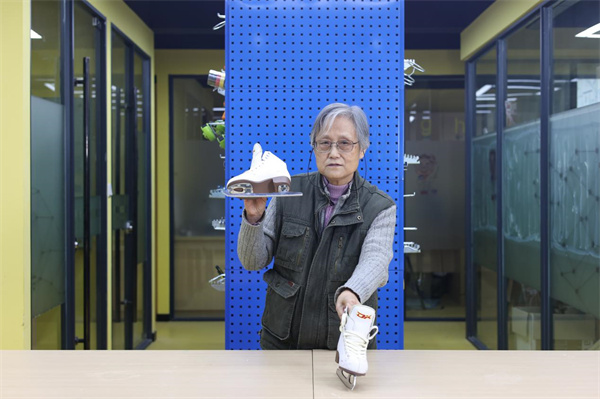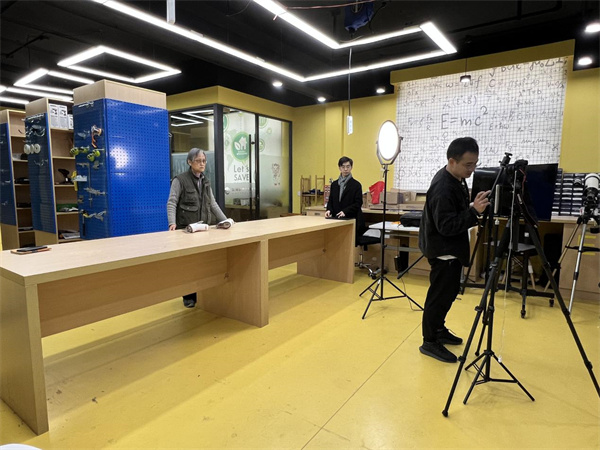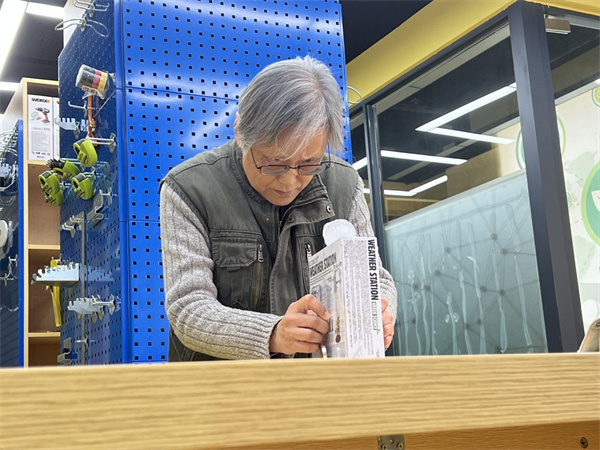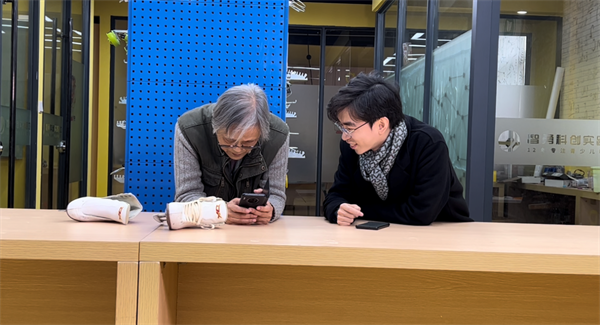‘Science Grandma’ Wu Yuren: there can be no digital divide for the elderly
(Editor’s note: There are only a few days left of 2021. In that time Eastday.com will tell the story of five people in Shanghai, who epitomise the city’s transformation and its future. In the first article, we sat down with “Science Grandma”, a retired physics professor whose name is Wu Yuren.)

In 2021, a retired professor in Shanghai became an idol of many young people. Called “Granny Wu” by netizens, 72-year-old Wu Yuren went viral for her hardcore yet entertaining videos about physics. In her opinion, learning physics isn't just about finishing written exercises.
On Oct. 27, Shanghai issued a five-year plan to further promote urban digital transformation, in which it proposed the concept of “elderly care with digitalization”.
How can elderly people keep up with the times in the city’s digital transformation? In the face of the surging wave of digitalization, Granny Wu said calmly that there cannot be a digital divide for the elderly.
Adept at Photoshop tools
Many scenes of Wu’s videos are shot in a science base for future young scientists, which is a testing ground for scientific wisdom.
The videographer is Li Haorong, who shoots videos and posts them on online platforms. At first, he invited different teachers to explain scientific concepts by doing experiments in the video. He noticed Granny Wu’s, videos always caused an online sensation.

(Granny Wu shoots her videos in the science base, with Li Haorong as the videographer.)
“Granny Wu is awesome, attracting many followers,” said Li. When working with Wu, he is always amazed by the elderly lady. “Many people worry that older adults may have technical problems when making short videos. But no worries for Granny Wu. She is more adept at using such apps as Photoshop than us.”
Li believes the success of Wu is not an accident.
“She treats her work seriously. Before shooting a video, she writes the script by herself,” said Li. To better explain physical theories by using items in daily use, she will try every means to look for proper “props”.

“Will it be better if I say like this?” After a number of modifications of her script, Wu will check with Li again. Then she picks up the prop and asks, “Is it clear in the video whether I put it on or above the desk?”
Raising curiosity in a fun way
Granny Wu told us an interesting story: “Once I hailed a taxi on an app, and there were many young white-collar workers surrounding me. When the driver arrived, he asked almost all the young people who hailed the taxi. Finally, he looked incredulously at me. Yes, I, a 70-year-old woman, hailed a taxi by myself.”
“People say there is a digital divide for the elderly. But for us, there may not necessarily be a divide,” said Wu.
As one of the three million or so senior citizens of Shanghai, Granny Wu is telling people that there can be no digital divide for elderly people and they are able to utilize digitalization.
There is no doubt that short video is one of the digital tools Granny Wu is most adept at. She said she has been an enthusiast of short videos since a long time ago.
“I’ve been following videos on Douyin about physical experiments,” said Wu, who believes that the videos are good but not good enough. “Some videos end with principles, but there’s a lack of explanation. For some who do not understand physics, after watching the videos, they can hardly relate the principles to reality.”
“So, what I want to do is explain,” said Wu. “It is difficult to explain sometimes, as some principles cannot be explained clearly in just one or two minutes, and some phenomena happen not just because of one principle. However, if the video is too long, few people are patient enough to watch.”

(Granny Wu talks with her assistant about how to explain a physical principle)
Digitization is a tool to promote urbanization. For educators like Granny Wu, it has also become a “blackboard” to spread knowledge.
“Actually, most of the physical principles come from the details in real life,” said Wu, hoping to encourage more people to look at life with curiosity through digital tools.
As she said, kids are most curious but some forget the habit of being curious which is a pity. One person’s ability is limited, but she is glad to make use of her capabilities to encourage certain people, if not all, to look at physics and life in a different way.
Looking back on the past year, Wu said she is happy. “I have retired, but I feel enriched every day.” In terms of being a science blogger, she said she is still pondering upon what she would do next. “I’ve got many ideas. Let’s wait and see.”
Q&As
Q: How has your 2021 been? What did you do this year?
A: I have had a very happy year. You have seen what I have done. I have a poor memory, so I can’t tell you exactly what I’ve done. But the main purpose of doing this [making science popularization videos] is to spread scientists’ spirit of doing research and seeking knowledge.
Q: How do you review what you have done this year?
A: To be honest, if you ask me if I really want to be a live-streamer, my answer is no. I can still impart knowledge if I give lectures to school students or play with the kids and teachers in the science base. But I am anxious about the situation. A few years ago, some people on the Internet said physics exams were not necessary. I can’t help but want to do some education, so I have to be “thick-skinned”. When shooting the videos, I have to be emotional, rather than acting like a rigid teacher. Otherwise, no one will listen to me. Sometimes, Prof. Lu (a colleague and partner of Wu before they retired from Tongji University) helps me with it. It is complicated, but I have to.
But I can’t reverse everyone’s thinking about physics, which I understand very well. The videos I make are about small things in life. These small phenomena may be of great use in the future. Of course, it requires researchers to have interest. Take the IgNobel Prizes for example. Many scientists have won the prizes. Some are Nobel Prize winners, but they do some fun experiments. When interest comes, you cannot stop it.
Q: What is your resolution for the new year?
A: Stimulating children’s interest in learning physics, which is definitely what I will keep doing. You do not have to work in the area of physics after learning physics. No matter what you do in the future, you need to learn physics, because it reflects the basic laws of nature and involves a wide range of areas. Physics exists in almost all walks of life. What’s more, there are social physics and economic physics. If you learn physics well, life can be easier. I’m also considering whether it is possible to teach longer courses. But what will be their effect? I have to think more about it.
Story by Wei Yifei, Bian Yinghao, Ren Xue'er (Intern)
Translated by Wu Qiong